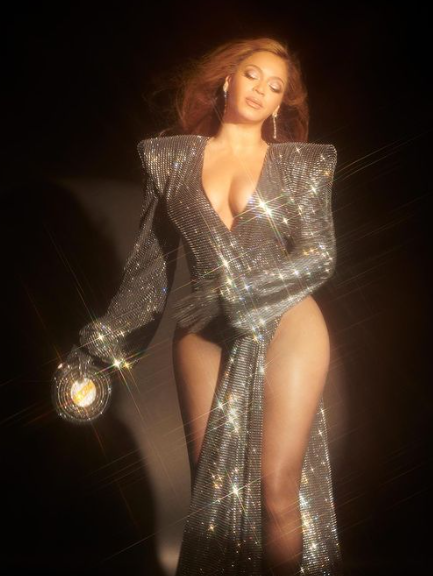
The Motomami versus the Alien Superstar: Divinity in the Digital Age
What is a woman?
Rosalía’s third studio album, MOTOMAMI (2022), and Beyoncé’s seventh, Renaissance (2022), propose this question in a million different forms. If there are two things which these albums fixate on, they are identity and womanhood; both are posited as questions with no clear answer. In fact, to navigate the impossibility this question presents, both Rosalía and Beyoncé create fictional characters around which their albums are constructed, the Motomami and the Alien Superstar. Built up as ethereal superheroines charged with womanhood too brazen to be questioned and identity too mercurial to be pinned down, these characters weave between the lines of the track lists. But are the motomami and the alien superstar simply different stylings of the same sentiment? And how might the way they propose hedonism as the apex of femininity flirt with ethical dilemmas of cultural privilege?
These albums can’t be discussed without mentioning their popularity. Renaissance now holds the record for the most single-day streams for a female artist’s album on Spotify, and Rosalía has smashed the record for the biggest debut for a Spanish-language, female-led album. The hashtag #aliensuperstar has amassed 90.7 million views on TikTok, and #motomami has racked up 3.1 billion. We’re in the eye of a digital dust devil whipped up by fringed bootsand cosmic hooves, and as it diffuses further into the mainstream, it looks to become a sandstorm.
The allure of the motomami and alien superstar aesthetics lies in how they walk the line between the ethereal and the everyday, simultaneously defining themselves as the “bar” to be judged against and deconstructing the hegemony of the traditional “bar” by which femininity has been evaluated. This contradiction is not ignored but rather spotlighted in the records, justified only by the confidence with which it is claimed. On ‘Saoko‘, Rosalía states:
“Me contradigo, yo me transformo” (I contract myself, I transform myself) / “Soy to’a las cosas, yo me transformo” (I am each and every thing, I transform myself)
Track 1, ‘Saoko’ – MOTOMAMI
With this sentiment, which echoes throughout the album, Rosalía gives herself licence to contradict herself under the caveat that transformation and changeability are integral to her sense of self. Renaissance also latches onto this idea. On ‘Alien Superstar’, Beyoncé opens with:
“…I’m one of one, I’m number one, I am the only one / Don’t even waste your time trying to compete with me / No one else in this world can think like me / I’m twisted, I’ll contradict it…”
Track 3, ‘Alien Superstar’ – Renaissance
Similarly to Rosalía, Beyoncé is fixated on the idea of contradiction as redefinition. By claiming to operate a level above the rest of the world, she pushes the audience to laud themselves by singing along. Beyoncé and her audience are thus encouraged to embrace the power of mutability, to see their own thoughts as valid, all-encompassing, and to embody the alien superstar. The Beyoncé that performs Renaissance is a Beyoncé possessed and uplifted by the many iconic black performers that made her who she is, and she tries her best to show her listeners the joy this gives her.
Throughout both albums, we see the artists move their audiences to embrace hedonism, reject tradition and put themselves on the pedestal they deserve. While Rosalía takes up the high street riding a lorry and tells her listeners “fuck el estilo, tela y tijera, y ya (fuck the style, it’s fabric and scissors, that’s it)”, Beyoncé refers to herself as “that girl”, “the bar” and reaffirms how her haters only live to “want” her. Both artists use their relevant records to construct a forcefield of solipsism that deflects jealousy, traditionalism and subordination. The motomami and the alien superstar exist within this forcefield, unable to be touched or criticised because, within it, they are untouchable; everything is relative to them and their worldview.

But is this philosophy- one which relies on solipsism and hedonism- actually functional? MOTOMAMI and Renaissance’s commercial successes would argue so, but the controversy attached to them? Perhaps not. Whilst there is little discussion on the artistic quality of the records, the same cannot be said about their ethics. Accusations of cultural appropriation have plagued both records. Rosalía is, at the end of the day, a white Spaniard, and MOTOMAMI’s interpolation of and reliance on Latino musical stylings and slang is heavy, to say the least. And despite indirectly linking the reference with her late gay Uncle Johnny, Beyoncé has met pushback for pulling on black queer slang and the iconic sharp synth stabs and cymbal-heavy sounds of classic vogue tracks.
Image Credits: @beyonce on Instagram
In fairness, both artists pay homage (perhaps inevitably) to iconic individuals of the groups from which they are taking inspiration, whether Justo Betancourt or the House of LaBeija. Furthermore, with Rosalía crediting Tokischa, Sky Rompiendo and Tainy, and Beyoncé working with TS Madison, Big Freedia and Honey Dijon, it’s evident that a lot of these influences have come from the source. But despite all of this, the names plastered on the front of the vinyl won’t be those of pioneering black trans women and Puerto Rican producers- and this is where many have indicated the problem lies.
All this controversy entails a discourse on whether this appropriation can be drawn up to the moral code under which these albums were advertised. That is, the moral code championing undiluted self-indulgence and “I think therefore I am” philosophy, championed by the albums’ two mascots. Would the motomami or alien superstar that we have been sold care about the ethical intricacies of sampling? In nothing but a thong and a motorcycle helmet, rocketing through the solar system on a hyper galactic stallion, I’d imagine not. These two albums and their mascots present intriguing and compelling views of femininity, but whether all that is tainted once you zoom out of the vacuums in which they posit themselves is a question perhaps just as endless as the one at the start of this article.
Listen to both Rosalía’s MOTOMAMI and Beyoncé’s Renaissance below:

